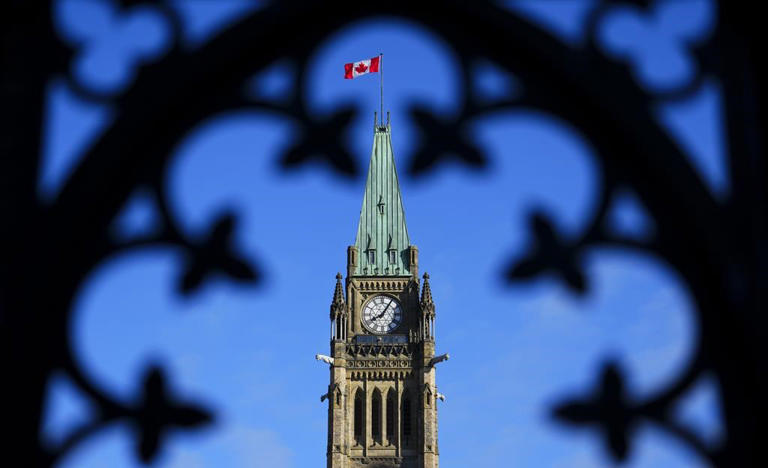Feds must release ‘secret’ record on Nazis in Canada: ‘We cannot move forward’

The Canada flag flies atop the Peace Tower on Parliament Hill in Ottawa
The apology by Prime Minister Justin Trudeau for a tribute by Parliament to a man who had fought in a Nazi unit is an important healing step — but more needs to be done, Jewish groups say. Namely, declassifying more of the “secret” information contained in the Deschenes Report.
These reports were completed after the Second World War and contain information on Nazis who came to Canada after the conflict ended. However, the names are all redacted, as is any information on how those individuals were allowed to come.
A former Liberal MP and current CEO of the Friends of the Simon Wiesenthal Center for Holocaust Studies told The West Block that he advocated for the declassification of the Deschenes Report, but says he carries shame that the government he served did not open the documents.
While specific numbers are not known, Michael Levitt said the historic consensus is about 2,000 people who fought for the Waffen SS and Galicia Division, in which the man initially honoured by Parliament served, came to Canada after the war.
“The namesake of our organization – Simon Wiesenthal, the Nazi hunter – he, in his later years, traveled the world, speaking out, looking to pursue justice. He actually refused to come to Canada,” Levitt said.
“He refused to set foot to Canada because he was so mortified by the shameful track record of successive governments in dealing with the dirty laundry.”
During Ukrainian President Volodymyr Zelenskyy’s address to Parliament, now-former House of Commons Speaker Anthony Rota recognized a constituent, 98-year-old Yaroslav Hunka, as a Ukrainian and Canadian “hero” for his military service fighting the Russians.
Afterward, it was discovered that Hunka fought for the 14th Waffen Grenadier Division of the SS, a volunteer Nazi unit primarily comprised of Ukrainians.
“We cannot move forward and learn the lessons of the past if we don't know the past,” B’Nai Brith CEO Michael Mostyn said alongside Levitt in a panel discussion. "And of course, our government records are still a secret. And that's a big part of the problem."
In the days since Hunka’s recognition, Mostyn said he received a phone call from a woman who said she had survived atrocities committed by that unit.
“She told me how this was the moment in time. Just don't stop. Keep going. Get the records open and tell Canadians what really happened,” Mostyn said.
“How did we let the Nazis into this country? And we are just not going to move beyond this scandal until that chapter is opened.”
Video: Renewed calls to take down Nazi-linked Ukraine monuments in Edmonton
On Wednesday, Immigration Minister Marc Miller told reporters that reopening the Deschenes Report is something that could be worth looking at. He noted that at times it was easier for Nazis to enter Canada than Jewish people.
This includes ex-Nazi death squad member Helmut Oberlander, who was expelled from the U.S. and facing a Canadian deportation battle when he died for having been an interpreter for Einsatzgruppe D, a paramilitary death squad. These units killed approximately two million people, mostly Jews, and were seen as a central part of Hitler’s so-called “Final Solution.”
Oberlander died in Waterloo, Ont. on September 20, 2021.
“[Oberlander] managed to evade justice, you know, dying as a very old man in the comfort of Canada,” Levitt said.
“In that case, for about 40 years, there was process after process underway and no government wanted to take action, including shamefully my own at the time. And this was something that I was very outspoken about, but it did not make a difference.”
Mostyn said that B’Nai Brith has filed several access-to-information requests in an effort to get more information on the contents of the Deschenes Report, but they’ve been unsuccessful. He believes embarrassment is the reason successive governments have been tight-lipped.
“If I had to guess, it would just be that there's going to be a lot of embarrassment over successive governments, as Michael said, but also other institutions like the RCMP, on how we could possibly have such indifference for Nazi perpetrators who came to this country and there were no prosecutions and no deportations,” he said.
Poland’s education minister has requested that country's Institute for Remembrance look into Hunka’s past service to see if there are grounds for his extradition.
No comments:
Post a Comment